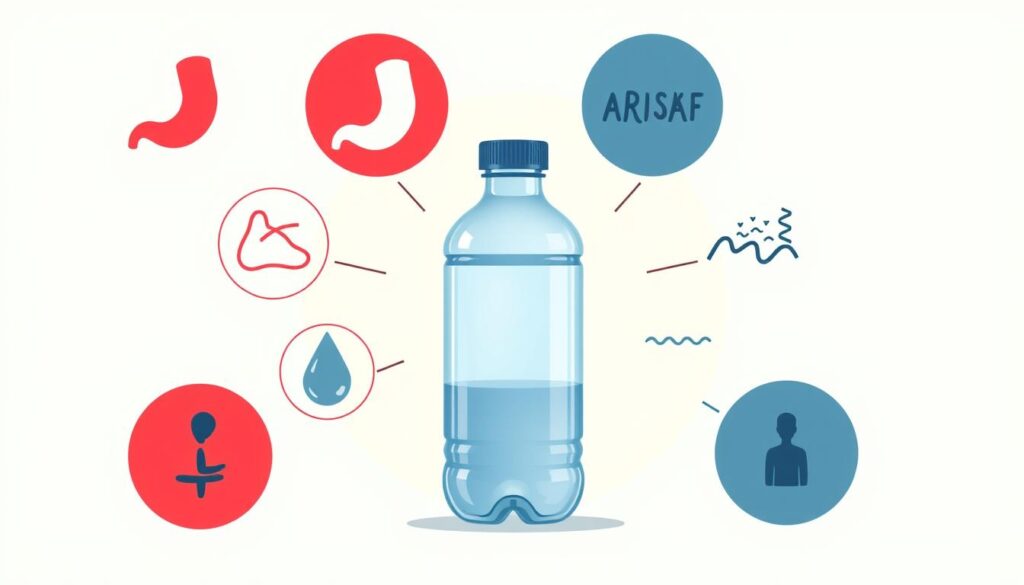Water fasting is a trend where you only drink water for 24 to 72 hours. It’s not just for religious reasons anymore. Many people use it to lose weight and get healthier. But, it’s not for everyone. Always talk to a doctor before starting.
In this article, we’ll look at what happens when you fast for weight loss. We’ll cover the good and bad sides, and how to do it safely.
Water fasting can help you burn fat and lose weight because you eat fewer calories. It might even start ketosis and autophagy, which help with weight loss and health. But, it can also cause problems like electrolyte imbalances and dehydration.
To avoid these issues, drink lots of water and replace lost electrolytes. If you feel really bad, stop fasting right away.
Water fasting might also improve blood sugar and heart health. But, we need more studies to know for sure. If you’re thinking about fasting, weigh the good against the bad. Look into other options like intermittent fasting or eating healthy foods.
By being careful and informed, you can enjoy water fasting safely. This way, you can focus on your health and well-being.
Key Takeaways
- Water fasting involves consuming only water for 24-72 hours, aiming for weight loss and health benefits.
- Fasting can lead to a calorie deficit, fat burning, ketosis, and autophagy, potentially aiding weight loss.
- Side effects may include electrolyte imbalances and dehydration, so it’s crucial to stay hydrated and replace electrolytes.
- Consult with a healthcare professional before water fasting to ensure safety and suitability.
- Explore safer alternatives like intermittent fasting or balanced diets for sustainable weight loss.
What is Water Fasting?
Water fasting means not eating any food and only drinking water for a certain time. It’s become popular for its health benefits, like losing weight and improving how the body uses energy. This practice has spiritual and religious roots but is now seen as a way to improve health.
Definition and Overview
When you water fast, you don’t eat or drink anything with calories. You only drink water. The time you fast can be short, like 24 to 72 hours, or long, like several days or weeks. It’s important to fast under a doctor’s watch to stay safe.
Water fasting is different from other fasts because you don’t eat anything. This means your body uses stored fat for energy, which can lead to health benefits. These benefits include changes in how your body works and might even affect your hormones.
Historical and Modern Uses
Water fasting has been around for a long time. It’s used in many spiritual and religious practices. For example, it’s a big part of Ramadan in Islam, Yom Kippur in Judaism, and Lent in Christianity.
Now, people are trying water fasting for health reasons. They think it can help with weight loss, detox, and overall health. But, it’s important to be careful and get advice from a doctor, as fasting for too long can be risky.
| Fasting Duration | Potential Effects |
|---|---|
| 24-72 hours | Initiation of ketosis, mild weight loss |
| 5-20 days | Reduced fasting blood sugar and insulin levels, improved insulin resistance |
| 7 days | Average weight loss of 12.5 pounds |
| 8 days | Average weight loss of 13 pounds, significant reductions in body fat |
Water fasting is popular for losing weight and improving health. But, it’s important to be careful and get advice from a doctor. Fasting for too long can lead to health problems, like not getting enough nutrients or having imbalances in electrolytes.
How Water Fasting Works for Weight Loss
Water fasting is a powerful way to lose weight. It puts your body into a state called ketosis. In ketosis, your body uses fat for energy instead of glucose from food.
This process, called lipolysis, breaks down fat into ketones. These ketones are a new energy source for your body and brain. The longer you fast, the more fat you burn, leading to weight loss.
Water fasting also starts a process called autophagy. It’s like recycling old cells for new, healthy ones. This not only helps with weight loss but also boosts overall health and longevity.
It reduces inflammation and improves organ function. This includes the heart, liver, and kidneys.
Calorie Restriction and Fat Burning
Water fasting eliminates calories, forcing your body to use fat for energy. The weight loss varies based on how long you fast and your starting weight. Studies show:
- Five-day fasters lost 4% to 6% of their weight
- Seven to 10-day fasters lost 2% to 10% of their weight
- Those fasting 15 to 20 days lost 7% to 10% of their weight
Remember, water fasting leads to quick weight loss. But, a lot of this weight is water, carbs, and muscle, not just fat. In long fasts, most weight loss is from lean mass, not fat.
Ketosis and Autophagy
Water fasting leads to ketosis, where your body burns fat for fuel. This not only helps with weight loss but also supports brain function and may reduce inflammation. It also speeds up autophagy, a process that cleanses cells and organs.
| Fasting Duration | Effects on the Body |
|---|---|
| 24-72 hours | Ketosis begins, fat burning increases |
| 3-5 days | Autophagy is significantly enhanced |
| 7+ days | Insulin and leptin levels decrease, inflammation reduces |
Fasting is the greatest remedy – the physician within.
Water fasting promotes weight loss and supports health. But, it’s important to do it safely and with a healthcare professional’s guidance. This way, you can avoid risks and side effects.
Benefits of Water Fasting Beyond Weight Loss
Water fasting is not just for losing weight. It can also reduce inflammation and oxidative stress, improving overall health. It helps the body get rid of old, damaged cells and replace them with new, healthy ones.

Potential Improvements in Blood Sugar and Insulin Sensitivity
Water fasting may also help control blood sugar levels. It makes the body use insulin better, which is good for people with diabetes or prediabetes. Studies show that fasting can lower blood sugar and insulin levels, helping with glucose control.
Possible Cardiovascular Health Benefits
Water fasting could also be good for your heart. It may lower blood pressure and improve cholesterol levels. This can help reduce the risk of heart disease by lowering LDL cholesterol and increasing HDL cholesterol.
| Health Benefit | Potential Mechanism |
|---|---|
| Improved insulin sensitivity | Enhanced body’s ability to efficiently use insulin and regulate blood sugar |
| Lower blood pressure | Reduction in hypertension risk factors |
| Improved cholesterol profile | Decreased LDL cholesterol and increased HDL cholesterol levels |
While these benefits are promising, more research is needed. People with health conditions or on medications should talk to a doctor before trying water fasting. It’s important to ensure safety and appropriateness.
Water Fasting for Weight Loss: What to Expect
Starting a water fast for weight loss means knowing what to expect. Fasts usually last from 24 to 72 hours, where only water is consumed. It’s best to do lighter activities like yoga instead of strenuous exercise to stay flexible and reduce stress.
People with physically demanding jobs should plan their fasts around work. This helps avoid feeling tired or dizzy. Drinking plenty of water is key to avoid dehydration, as food often provides 20-30% of our daily water.
“Water fasting can lead to significant weight loss, with studies showing a five-day fast resulting in a 4-6% reduction in body weight.”
But, a lot of this weight loss might be from muscle, not fat. To keep muscle after fasting, eat a diet full of:
- Fruits and vegetables
- Nuts and legumes
- Lean proteins, like plant-based or fish
| Fasting Duration | Expected Weight Loss |
|---|---|
| 5 days | 4-6% |
| 7-10 days | 2-10% |
| 15-20 days | 7-10% |
Water fasting can improve blood pressure, cholesterol, and blood sugar in the short term. But, these benefits often fade when we go back to regular eating. Always talk to a doctor before starting a water fast to make sure it’s safe for you.
How to Prepare for a Water Fast
Getting ready for a water fast is key to a safe and effective experience. Before starting, it’s important to take steps to avoid risks and get the most from fasting for weight loss.
Consulting with a Healthcare Professional
First, talk to a healthcare professional. They can check your health, discuss risks, and give advice tailored to you. This is especially important if you have health issues or take medications that fasting might affect. Always fast under a professional’s watch, especially for more than three days or with health conditions.
Gradually Reducing Food Intake
To ease into fasting, slowly cut down on food before starting. Eat less and focus on foods like fruits, veggies, lean proteins, and whole grains. This helps your body adjust and makes fasting easier. Remember, the right preparation and aftercare are key to avoiding harm and safely returning to eating after fasting.
Staying Hydrated and Replacing Electrolytes
Drinking enough water is crucial during fasting. Men should drink about 13 cups a day, and women about 9. Spread out your water intake to keep your body balanced. Also, use mineralized water or add a bit of Himalayan salt to your water to replace lost electrolytes. This helps avoid dizziness and other side effects after fasting for 2-3 days.
When ending your fast, start with small, light meals like orange or lemon juice. Gradually move to more solid, nutritious foods like fruits, veggies, and plant-based proteins. Be careful not to rush this to avoid refeeding syndrome, a serious condition from sudden changes in fluids and electrolytes after fasting.
| Fasting Duration | Recommendations |
|---|---|
| 1-3 days | Can be done independently, but listen to your body and break the fast if needed |
| More than 3 days | Requires medical supervision and consultation with a healthcare professional |
By following these steps and guidelines, you can prepare for a safe and successful water fast. This way, you can enjoy the benefits for weight loss and health while avoiding risks and side effects.
Potential Side Effects and Risks of Water Fasting
Water fasting might seem beneficial, but it comes with risks. It’s important to know these risks, especially if you’re fasting without a doctor’s help. Skipping meals for too long can harm your health. So, it’s key to understand the downsides of water fasting carefully.

Nutrient Deficiencies and Electrolyte Imbalances
Water fasting can lead to nutrient and electrolyte imbalances. This can cause symptoms like fatigue, dizziness, and nausea. These issues are worse for people with health problems or on certain medicines.
Long-term fasting can also hurt your kidneys. It can make your heart health worse. Here’s a table showing some of these problems:
| Nutrient/Electrolyte | Potential Deficiency/Imbalance | Associated Risks |
|---|---|---|
| Glucose | Low blood sugar levels | Fatigue, dizziness, nausea |
| Electrolytes (e.g., sodium, potassium) | Electrolyte imbalances | Muscle cramps, heart arrhythmias, kidney dysfunction |
| Calcium | Calcium deficiency | Bone loss, increased fracture risk |
| Iron | Iron deficiency anemia | Fatigue, weakness, impaired immune function |
Refeeding Syndrome
Refeeding syndrome is a big risk with water fasting. It happens when you eat too much too fast after fasting. This can cause serious problems like heart failure and seizures.
Refeeding syndrome is a potentially fatal condition that can occur when nutrition is reintroduced too quickly after a period of starvation or malnutrition. It is characterized by severe electrolyte and fluid shifts, leading to serious complications such as cardiac arrhythmias, respiratory failure, and seizures.
To avoid refeeding syndrome, start eating slowly under a doctor’s watch. This helps your body adjust to food again safely.
In summary, water fasting might help with weight loss, but it’s risky. Nutrient and electrolyte problems, and refeeding syndrome are serious issues. Always talk to a doctor before fasting to stay safe.
Who Should Avoid Water Fasting
Water fasting is popular for weight loss, but it’s not for everyone. Kids and teens need nutrients for growth and should not fast. Pregnant and breastfeeding women also need more nutrients for their babies and should not fast for long.
People with gout or insulin-dependent diabetes should not fast. Fasting can make gout worse and can be dangerous for diabetes. It can cause blood sugar levels to drop too low.
The elderly, especially those over 75, should be careful with fasting. As we age, our bodies get weaker and can’t handle fasting as well. A 2018 study showed fasting can help with weight and blood pressure, but it might not be safe for older adults.
Those with eating disorders should also avoid fasting. Fasting can trigger bad eating habits and lead to relapse. The National Eating Disorders Association says nearly 30 million Americans will face an eating disorder at some point.
“It is advisable to consult with a healthcare provider prior to starting any new diet or cleanse, and seeking advice from a registered dietitian can aid in developing a healthy eating plan that aligns with individual needs.”
Before starting a water fast, talk to your doctor. They can check if fasting is safe for you. They might suggest other ways to lose weight, like eating healthy foods or intermittent fasting with some food.
Water fasting might help some people, but it’s not for everyone. Always put your health first when thinking about diet changes or weight loss.
Alternatives to Water Fasting for Weight Loss
Water fasting might not work for everyone. Luckily, there are other ways to lose weight safely and effectively. These alternatives avoid the risks of water fasting.
Intermittent Fasting Methods
Intermittent fasting is a flexible way to lose weight. It includes time-restricted eating (TRE) and 16/8 fasting. TRE means eating all meals in 8-12 hours and fasting the rest of the day. The 16/8 method means fasting for 16 hours and eating in an 8-hour window.
These methods help keep your daily nutrient intake while fasting. They can improve insulin sensitivity and help with fat loss.
Balanced, Nutrient-Dense Diets
Another option is a balanced diet that supports weight loss and health. The Mediterranean diet is a great example. It focuses on whole grains, fruits, vegetables, legumes, nuts, and lean proteins like fish.
This diet is linked to many health benefits. It helps with weight management, reduces chronic disease risk, and can increase longevity.
| Intermittent Fasting Method | Description | Potential Benefits |
|---|---|---|
| Time-Restricted Eating (TRE) | Consuming meals within a specific window (e.g., 8-12 hours) and fasting for the remaining hours | Improved insulin sensitivity, fat loss, and circadian rhythm regulation |
| 16/8 Fasting | Fasting for 16 hours and eating within an 8-hour window | Increased fat burning, reduced inflammation, and improved brain function |
| Alternate-Day Fasting (ADF) | Alternating between fasting days (consuming 0-25% of daily calorie needs) and non-fasting days | Weight loss, improved cardiovascular health markers, and reduced risk of type 2 diabetes |
Incorporating a variety of whole grains, fresh fruits, vegetables, legumes, nuts, and lean proteins into your diet can support weight loss efforts while providing essential nutrients for optimal health.
Exploring these alternatives can help find a weight loss method that fits your needs. Always talk to a healthcare professional before changing your diet or fasting routine.
Tips for a Safe and Effective Water Fast
Before starting a water fast, talk to a healthcare professional. They can check if it’s safe for you. Eating less and skipping snacks before the fast helps your body get ready. This step lets your body adjust and helps you see if fasting is right for you.
It’s key to drink lots of water during the fast. This helps make up for the water you usually get from food. If you feel dizzy, nauseous, or very tired, stop fasting and talk to your doctor.
Water fasting might help you lose weight and feel better. But it’s not for everyone. People with health issues, pregnant or breastfeeding women, and those with eating disorders should not try it. Always check with a healthcare professional before starting any new diet or fasting plan.




